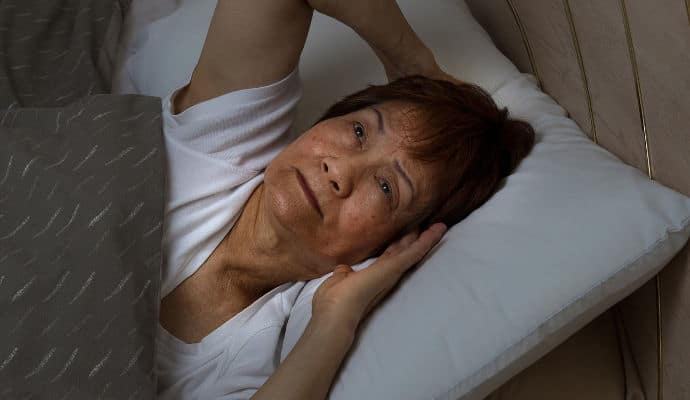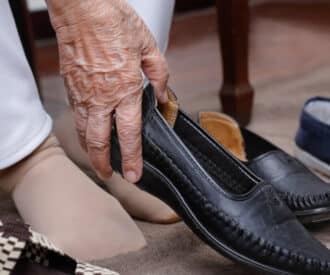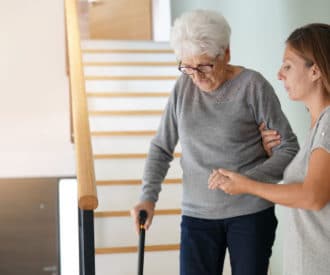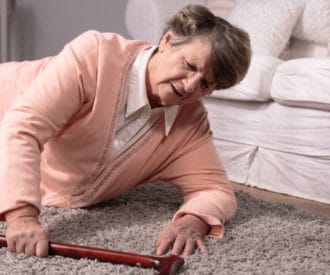
Seniors have more trouble sleeping through the night
Sleep patterns change with age, causing many seniors to have a harder time falling asleep and staying asleep.
And when your older adult gets up in the night, you might need to get up to make sure they don’t fall while going to the bathroom, try to leave the house, or do something that could cause an injury.
This chronic sleep deprivation is tough on both seniors and caregivers.
We explain why seniors have more trouble sleeping at night and share 2 ways to solve senior sleep problems so you can both get better rest.
Common reasons for senior sleep problems
Understanding why older adults have trouble getting a good night’s sleep can help you improve the situation.
But if you ask why they can’t sleep, they often won’t know or be able to clearly express the reasons. Most likely, you’ll need to be a detective to figure out the causes.
Common reasons for poor sleep include:
- Discomfort from medical conditions
- Medication side effects
- Needing to urinate more frequently
- Irregular sleep/wake schedule
- Daytime napping
- Too much time spent in bed
2 ways to solve senior sleep problems and improve well-being
To help both of you sleep better at night, you may need to try different things before you find a combination of solutions that works.
While you experiment, only change one thing at a time and give it some time – older bodies are slower to adjust. Then you’ll be able to figure out what works and what doesn’t.
1. Consult their doctor
- Write down when your older adult sleeps and wakes for about a week so you can clearly describe their schedule.
- Ask if pain from medical conditions or medication side effects could be causing problems with sleep. Find out if increasing / decreasing doses, changing the drug, or changing medication timing could improve the situation.
- Ask if a light pain reliever (like acetaminophen) before bed or a safer sleep aid (like certain antihistamines) would be safe and helpful.
2. Experiment with lifestyle changes
Beverages
- Limit caffeine consumption, even during the day. Secretly switch their coffee or tea to decaf if they refuse to give it up.
- Limit liquids several hours before bedtime. Try to get your older adult to drink more water earlier in the day.
- Always ask them pee (or at least try) before going to bed.
- If they get up frequently because they’re concerned about having an accident, encourage wearing disposable underwear at night for peace of mind or “just in case” – not with the intention to use them.
Routine
- Keep your older adult on a regular daily schedule. Waking up and going to sleep at the same time every day helps signal their body that it’s time for bed.
- Limit the length and frequency of daytime naps, especially in the afternoon.
- Decrease the amount of time spent in bed. For example, if they usually sleep from 10pm to 8am, consider moving to an 11pm to 7am schedule.
- Try a wind-down period starting an hour before bed. Play calming music, focus on a mellow activity, or give a brief massage to loosen muscles.
Comfort
- Make sure their mattress is comfortable and supportive.
- Adjust blankets and keep the room at a moderate temperature so they won’t get too hot or too cold.
- Consider getting a pillow or stuffed animal for them to cuddle so they’ll feel safe and warm.
- Use different body positions and support pillows to decrease pain or discomfort.
Recommended for you:
- 5 Tips to Improve Sleep in Dementia
- 3 Top Benefits of a Daily Routine for Seniors
- 11 Tips to Improve Senior Sleep by Reducing Pain and Discomfort
By DailyCaring Editorial Team
Image: Sleep On It





Mary Ambala
I have been enlightened especially on setting routine for waking and sleeping , reducing caffein and water intake in the afternoon and reducing pain and discomfort. Thank you.
How do I reduce smoking cigerrettes day and night for my 83 year old mother
DailyCaring
We’re so glad our articles and suggestions have been helpful! To help your mother quit or reduce her smoking habit, it would be best to speak with her doctor. They should be able to recommend a treatment that suits your mother’s situation.